#Enslaved Africans
Explore tagged Tumblr posts
Text
#black history#africa#racial injustice#burial ground#enslaved africans#blacklivesmatter#black lives matter#black people#911#black history facts#black history month#black liberation#slavery#american history#black power#black men#black women#black children#twin towers#new york
304 notes
·
View notes
Text
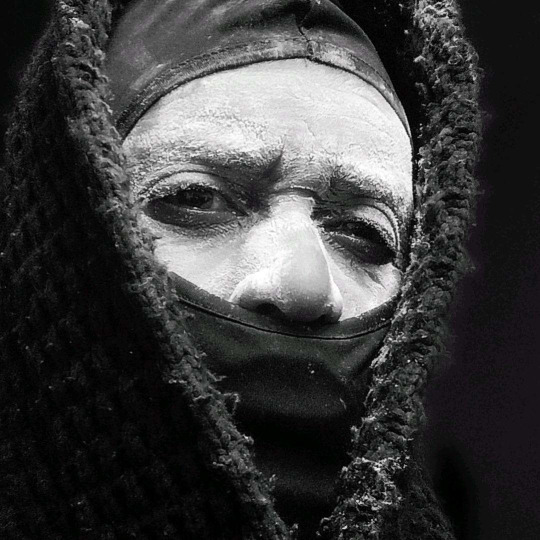
Jamaican Obeah
Jamaican Obeah refers to the practice of Obeah, a spiritual and magical tradition rooted in West African and Caribbean cultures. Obeah has a significance presence in Jamaica and holds cultural and historical importance on the island. Obeah in Jamaica has its roots in the spiritual beliefs and practices brought to the Caribbean through the transatlantic slave trade. Enslaved Africans brought with them a rich tapestry of religious and spiritual traditions, and Obeah emerged as a distinct syncretic practice in Jamaica. Individuals who practice Obeah are often referred to as "Obeah men" or "Obeah women". These practitioners have a deep understanding of the spiritual realm and are sought after for their abilities in healing, protection, divination and other spiritual services.
It's crucial to approach discussions about Jamaican Obeah with cultural sersitivity, recognizing the diversity of beliefs and practices within the Afro-Caribbean spiritual landscape. Different individuals and communities may have variations in their practices, and interpretations may differ among practioners. Respect for cultural beliefs and traditions is essential and fostering understanding.
#Obeah#Spiritual#Magical#Tradition#West African#Caribbean#Culture#History#Enslaved Africans#Syncretic Practice#Healing#Protection#Divination#Afro-Caribbean#Jamaica
85 notes
·
View notes
Text

I knew that the Catholic Church via the Pope had authorized slavery in the 1400s, but I didn’t know that they had authorized the eradication, subjugation, etc, of African people. Somehow I never connected the two.

“We grant you [Kings of Spain and Portugal] by these present documents, with our Apostolic Authority, full and free permission to invade, search out, capture, and subjugate the Saracens and pagans and any other unbelievers and enemies of Christ wherever they may be, as well as their kingdoms, duchies, counties, principalities, and other property […] and to reduce their persons into perpetual servitude.”
These clearly refers to the lands along the coast of West Africa. By these decree, Pope Nicholas V conceded to the King of Portugal Afonso V and Prince Henry and all their successors, all their conquests of Africa, and reduction to perpetual servitude of all people deemed non-believers and enemies of Christ, and all their properties.
A significant subsequent concession given by Nicholas V in a brief issued to King Alfonso in 1454 extended the rights granted to existing territories to all those that might be taken in the future. Together with a second reference to some who have already been enslaved, this has been used to suggest that Nicholas sanctioned the��purchase of black slaves from “the infidel”: “… many Guineamen and other negroes, taken by force, and some by barter of unprohibited articles, or by other lawful contract of purchase, have been … converted to the Catholic faith, and it is hoped, by the help of divine mercy, that if such progress be continued with them, either those peoples will be converted to the faith or at least the souls of many of them will be gained for Christ.”
This bull is currently conserved at the Institute of the National Archives of Torre do Tomba in Lisboa, Portugal, under the reference PT/TT/BUL/0007/29 and is fully translated to French in the book “le Péché du pape contre l’Afrique” (The Sin of the Pope against Africa) (éd. Al qalam, Paris, 2002) de Assani Fassassi, P. 10 – 21.
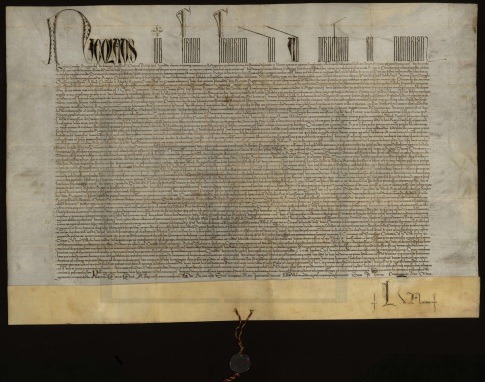
#catholics and slavery#pope nicholas v#dum diversas#Dum Diversas or The Vatican’s Authorization of Slavery#who started slavery of Africans#Enslaved Africans#catholic church is paying Reparations#Reparations
68 notes
·
View notes
Text
#gwa tambu#grenada#dance#west african#enslaved africans#transatlantic slave trade#carriacou#mmb#african roots
2 notes
·
View notes
Text
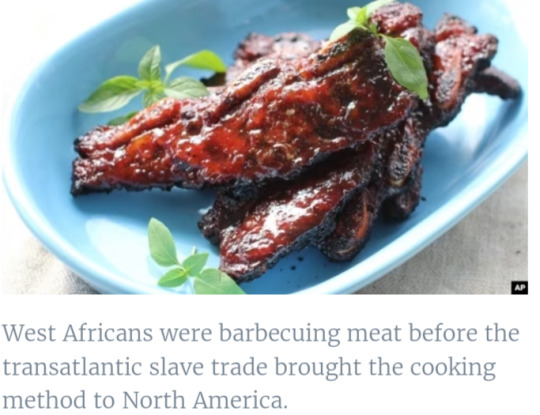
How Enslaved Africans Helped Invent American Cuisine
Lovely, fascinating, appetizing reading for the family here at SC. As we welcome more folx with African blood into our family, Juneteenth becomes an important rite.
LF found this article while researching African foods brought to America. We'll be using this piece to create our own traditional Juneteenth menu for next spring.
4 notes
·
View notes
Text
#ghana#dominicanos#dominican republic#door of no return#transatlantic slave trade#slavery#enslaved africans#gana#lmsu
0 notes
Text
The Remarkable Reign of Miguel I of Buría: A Tale of Defiance and Freedom
Miguel I of Buría, also known as King Miguel, Miguel the Black, and Miguel Guacamaya, was a remarkable historical figure with a legacy that transcends time. His journey from enslavement in San Juan, Puerto Rico to becoming the King of Buría in modern-day Lara, Venezuela is a testament to his resilience, leadership, and unwavering spirit. It was in 1552 that Miguel’s reign began, a period of…

View On WordPress
#African History#Black American History#Black History#enslaved Africans#first African rebellion#King Miguel#Miguel Guacamaya#Miguel I of Buría#Miguel the Black#Slave rebellion
0 notes
Text
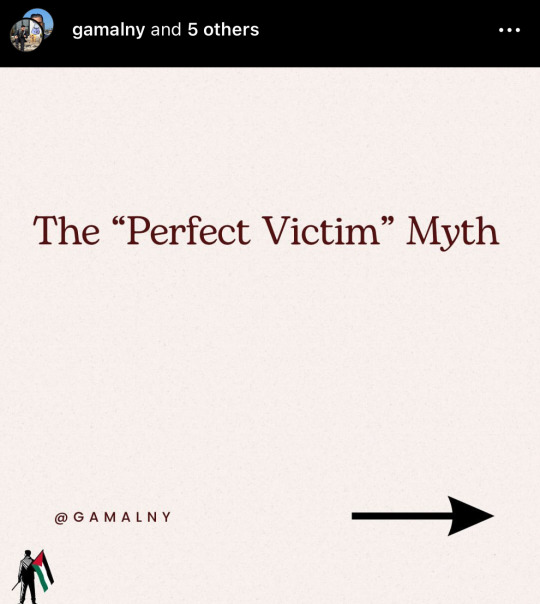
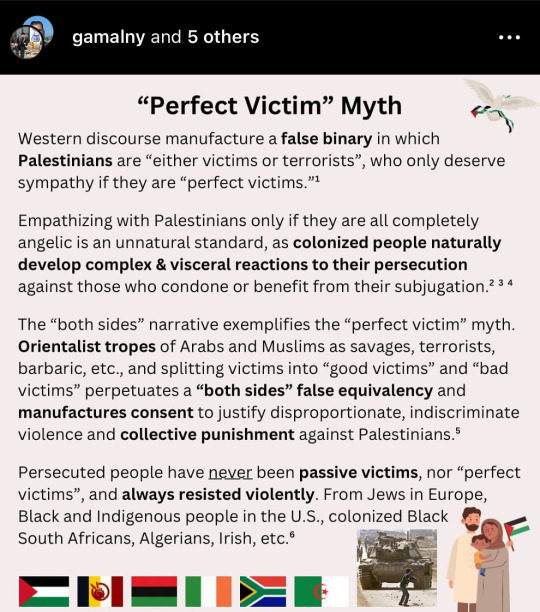
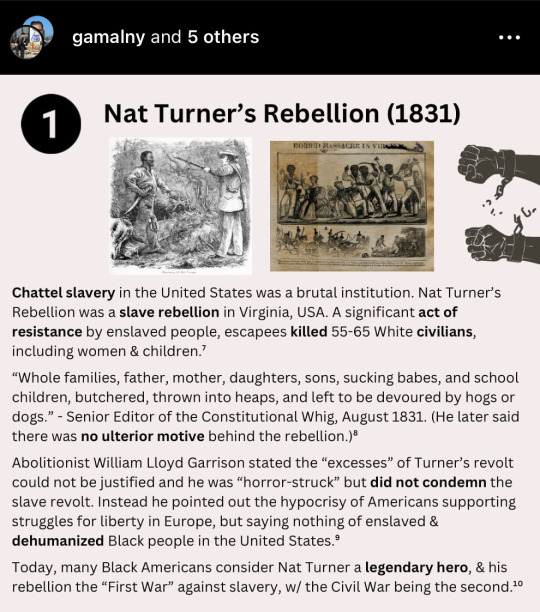
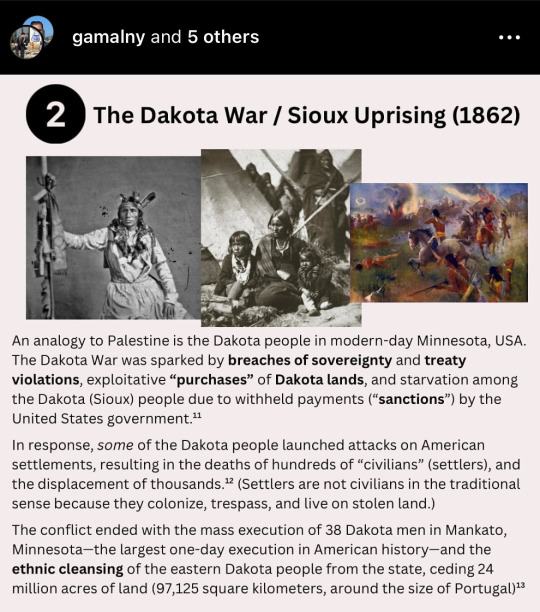
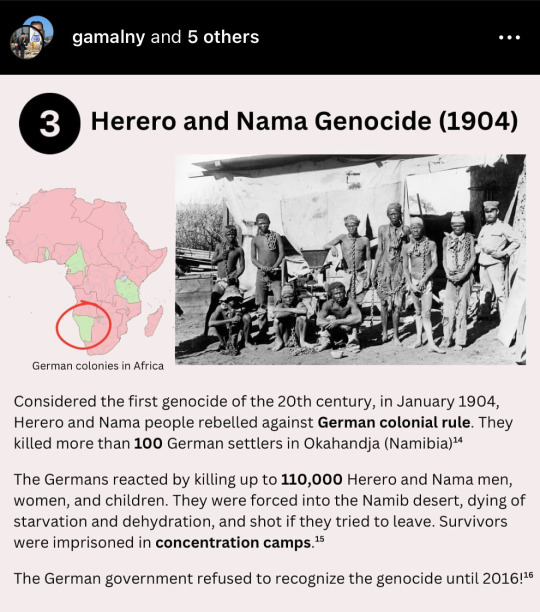
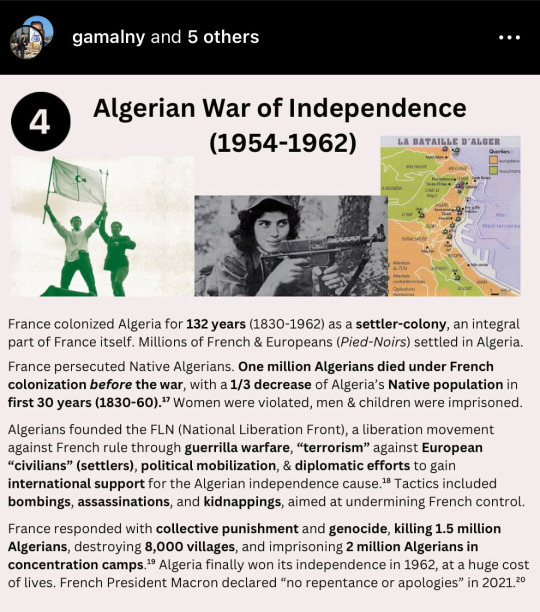

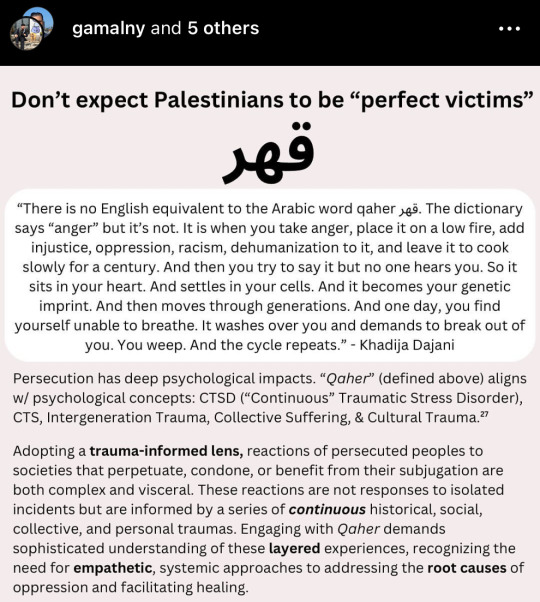
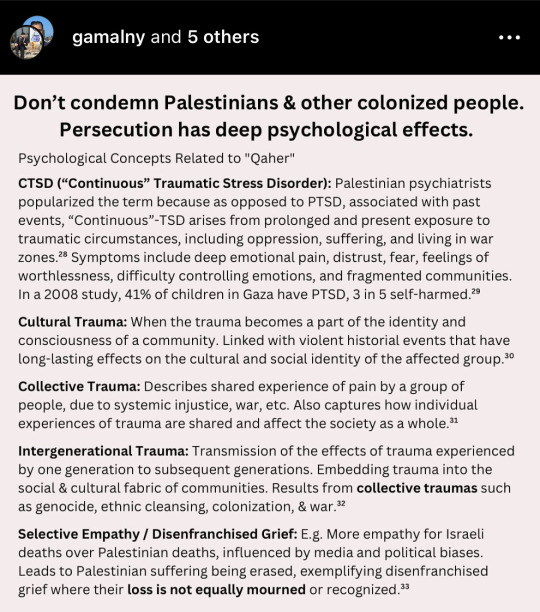

646 notes
·
View notes
Text

Portrait of Emmanuel Rio
Artist: Albert Schindler (Austrian, 1805–1861)
Date: 1836
Medium: Oil on Panel
Collection: Art Institute of Chicago, Chicago, Illinois, United States
DESCRIPTION
Previously known only as “a gardener and horn player,” recent research has identified the figure in this painting as Emmanuel Rio, an enslaved Brazilian man of African descent who was sent to Emperor Francis I in Vienna around 1820. About ten years old when he arrived in Vienna, Rio was enrolled in an elite private school, where he excelled in French, Italian, drawing, and especially music. Francis fostered his talent, gifting Rio a French horn on the occasion of his graduation. Despite his aptitude for music, Rio was assigned to work in the imperial garden.
In this portrait, produced a year after the emperor’s death, Rio holds his favored instrument while looking at an image of Francis, beneath which hangs a gold watch given to him by the monarch. The painting’s sentimentality does little to suggest the precariousness of its subject’s situation in Vienna, which only worsened after Francis died. For the rest of his life, Viennese officials moved Rio to various positions throughout Europe, threatened him with forced military service when he resisted, and, by the late 1840s, discussed sending him back to Brazil or to Africa.
#portrait#emmanuel rio#brazilian#african#gardener#horn player#landscape#plants#garden pots#enslave man#albert schindler#austrian painter#european art#history#oil on panel#art institute of chicago#19th century painting#austrian culture#austrian art
35 notes
·
View notes
Text
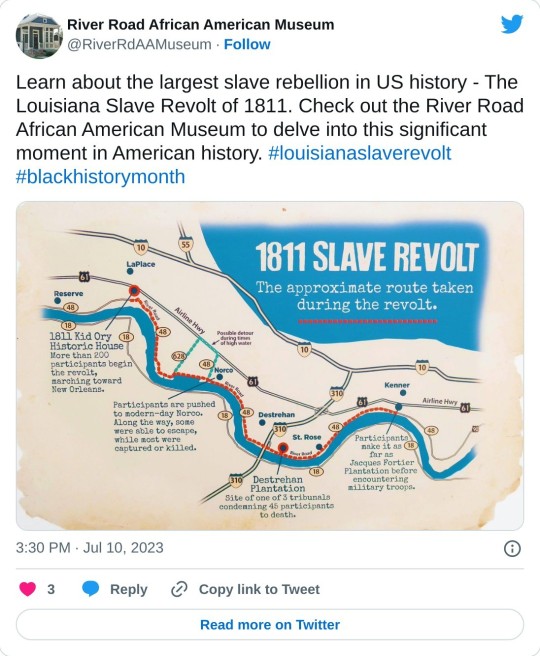
My family has a museum on River Road in Gonzalez Louisiana. the history will make you run through the fields running and crying. the bloody river road will never leave my memory..
#River Road African American Museum#River Road#Gonzalez Louisiana#louisiana#plantations#murder of Enslaved#Black History Matters#Black Lives Matter#Charles DesLonde#Kathy Hambrick#Hambrick Mortuary
236 notes
·
View notes
Text
learning abt how deeply woven the Quran and muslims are in the fabric of american history….
#a conservative 30% of enslaved africans were muslim????? nowhere was i taught that in school#jefferson had his own copy of the quran he purchased as a student and referred to often for comparative analysis???#explicitly wrote in jews muslims and hindus to have religious freedom in the virginia statute???#history is soooo fascinating fr like that man had people he considered his property and yet . he said all that#seedpost
9 notes
·
View notes
Text
The Spectator: The fact that collapses the case for slavery reparations
The case for slavery reparations seems to be growing louder every day. This week, indigenous representatives from 12 Commonwealth countries called on King Charles to begin the process of paying reparations. The King has personally expressed sorrow for the suffering of slaves and Buckingham Palace has said that it is taking the issue of reparations ‘profoundly seriously’. Earlier this year, a former BBC journalist committed to sending £100,000 in aid to the Caribbean to atone for her own family’s historical links to the slave trade.
The voluntary role that many Africans played in the transatlantic slave trade is ignored
The central thesis of slavery reparations is that white majority countries owe money to ethnic minorities as their ancestors may have enslaved others or benefited from a slave-system economy.
There is a problem with this though: ultimately, the great evil of slavery was practised by all inhabited continents and all races. And there will be almost no one alive today in the world who doesn’t have an ancestral link to the slave trade. This fact collapses the modern-day reparations argument.
Take the Afro-Omani slave trader Tippu Tip, who in 1895 was reported to have seven plantations and own 10,000 slaves. He was one of the largest slavers in all of East Africa.

Most popular
The sad truth about Phillip Schofield
Long before the transatlantic slave trade began, slavery was commonplace in many parts of the globe. As Al-Tabari, the Muslim scholar, showed in the mid-ninth century, the Basra port at al-Ahwaz alone had about 15,000 enslaved workers. Even in New Zealand, Maori chiefs enslaved prisoners of war – occasionally going as far as eating them in tribal feasts. The further you go back in history the longer the list of slavers grows, including everyone from the Ancient Egyptians to the Shang dynasty in China.
Given that many of the nations now calling for reparations also enslaved and sold others, the reparations argument when brought to its logical conclusion would have to demand that descendants of African slavers owe reparations to those who may have been the victims of slavery.
This argument could even be applied to the white descendants of the victims of the Barbary slave trade. Though undoubtedly far smaller than the transatlantic slave trade, the Barbary trade still saw over one million Europeans captured by North African pirates in slave raids between the 16th and 18th centuries.
So why is this devastating blow to the reparations argument often ignored? Politically, it seems that although we generally accept that slavery was universal in ancient history, we often pretend that only European powers practised slavery from the 16th century onwards, when this is clearly not the case. Meanwhile, the voluntary role that many Africans played in the transatlantic slave trade is also ignored.
Generally the European powers, with the exception of Portugal, lacked the resources to delve deep into the African continent for slaves. They were instead met at the coast by willing traders looking to make a profit by selling their fellow man. Though it is undoubtedly true that the rise of the transatlantic trade encouraged the growth of African slavers, this does not excuse those who took part in the trade.
Nor did slavery end in Africa when European colonialists were removed from the continent. When the Portuguese were forced off the East African Coast in 1699 by the Imam of the Omani Empire, he himself owned about 1,700 slaves.
The same is true for colonies outside Africa. In the early 1820s, Brazil broke away from the Portuguese Empire. Despite its later anti-slavery treaties with the UK, Brazil would continue importing about 750,000 slaves between 1831-1850. In 1844 it refused to renew the Anglo-Brazilian anti-slave trade agreement. Brazil’s slave trade only effectively stopped after 1850 when the UK formed a naval blockade in its coastal waters.
During the age of abolition led by Britain, the King of Dahomey (a West African Kingdom in modern day Benin) reportedly protested to a British officer that:
‘The slave trade has been the ruling principle of my people. It is the source of their glory and wealth. Their songs celebrate their victories and the mother lulls the child to sleep with notes of triumph over an enemy reduced to slavery.���
Some independent African nations and empires continued to allow slavery well after abolitionism in Europe. This was especially true in the eastern side of Africa where it was more difficult for the British to influence local politics and for the Royal Navy to enforce abolition.
From the 1860s onwards, Bemba chiefs in North-Eastern Zambia traded ivory and slaves for guns. As the supply of elephants for ivory depleted, the chiefs moved to selling even more slaves. In Barotseland, the monarch Lewanika was considered king of the Barotses, a South African ethnic group. From the beginning of his reign in 1878 until the region became a British protectorate, oral sources claim that up to a third of his subjects were slaves.
There is no question that the Euro-American trade in slaves – which began with Portugal and later included other colonial powers like France and Britain – was huge in size. This evil should never be forgotten.
But neither should we forget that people from all parts of the world, races and religions took part in what was one of the most horrid systems in human history.
In many parts of the world today, slavery is still rife. Rather than trying to create division by blaming people for the sins of their ancestors, we should instead come together to try and solve the problems we face today.
#The fact that collapses the case for slavery reparations#Reparations#African enslaved#enslaved Africans#British wealth born from the labor of Enslaved Africans
8 notes
·
View notes
Text
i want to make a sewing piece with flowers from different liberation movements — e.g. lavender for queers, poppy for Palestine...
anyone have information on flowers linked to other movements / cultures? For instance, Black liberation or Latin American / Indigenous liberation?
#rn i'm thinking of doing a rose for Indigenous America because they#are native to here + are meaningful to various cultures#+ they make me think of Latin American liberation theology bc of their association with our lady of guadalupe#and the flower of a black-eyed pea for Black liberation because enslaved Africans were able to bring those plants with them#to the americas and nourish themselves with that memory of home#could also do sunflowers as an important staple crop to many Native American cultures (“the fourth sister”)#plus apparently sunflowers were used in some feminist movements? but i'll have to look into which ones Just In Case#averygaypost
25 notes
·
View notes
Text
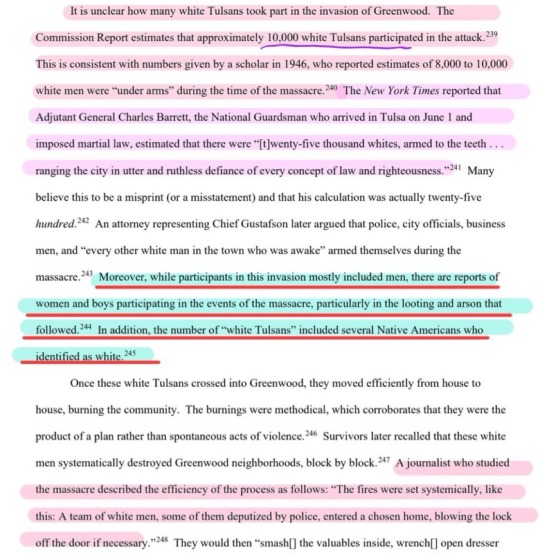
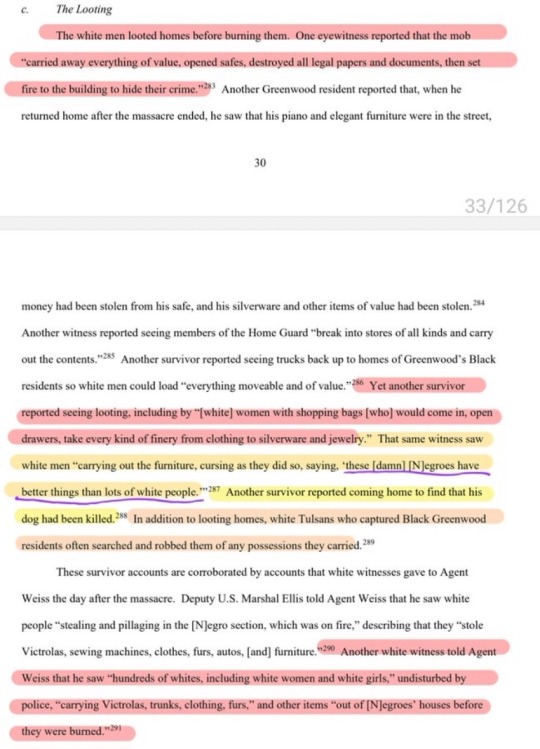
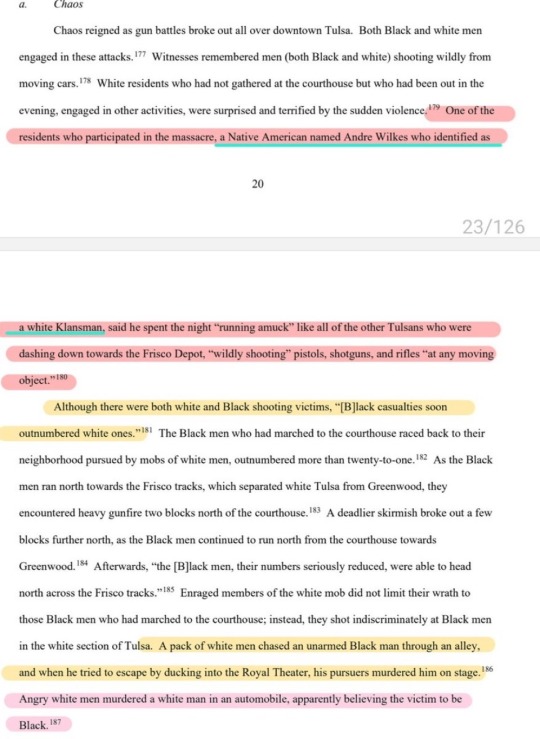
SOMEONE NEEDS TO FIND OUT WHAT TRIBE ANDRE WILKES BELONGED TO SO THEY CAN BE ADDED TO THE LIST WITH THE OTHER TRIBES THAT OWE ADOS REPARATIONS(Cherokee, Seminole, etc)
@queen-shiba
#blackblr#ados#african american#african american history#American descendants of slavery#soulaan#we knew the white people were horrible but the Native American tidbit is new#at this point#the ADOS reparations list is getting long with all the groups in it#honestly#the five tribes that enslaved black people live in Oklahoma#if I had to guess a likely suspect Andre Wilkes probably belonged to one of those five#tulsa oklahoma#tulsa race massacre
6 notes
·
View notes
Text
1 note
·
View note
Photo
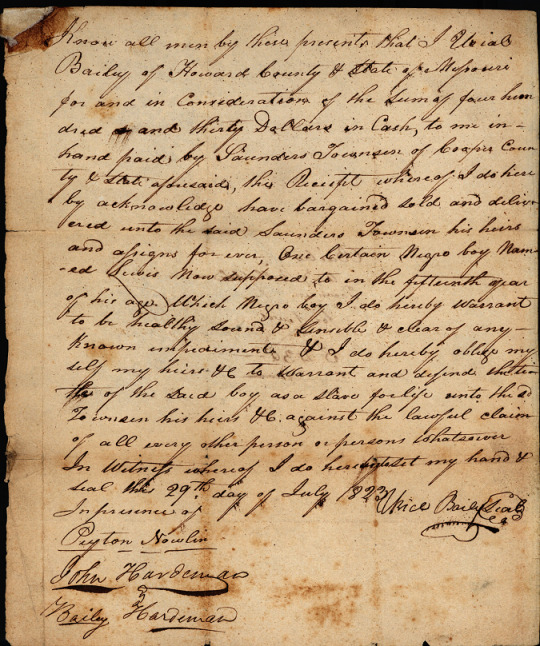
Fifteen-year-old Lewis was sold for $430 on July 29, 1823. During the Civil War, Lewis would serve in the U.S. Army, for which his enslaver Sanders Townsend requested compensation from the U.S. Government.
Record Group 21: Records of District Courts of the United States
Series: Slave Compensation Records
File Unit: Slave Compensation File for Claimant Sanders Townsend
Transcription:
Know all men by these present that I Urial Bailey of Howard County of State of Missouri for and in consideration of the sum of four hundred and thirty Dollars in cash, to me in hand paid by Saunders Townsen of Cooper County of State aforesaid, this Receipt whereof I do hereby acknowledge have bargained sold and delivered unto the said Saunders Townsen his heirs and assigns forever, one certain Negro boy named Lewis now supposed to be in the fifteenth year of his age. Which Negro boy I do hereby warrant to be healthy sound + sensible + clear of any known impediments + I do hereby oblige my self my heirs +c to warrant and defend the title of the said boy as a slave for life unto the sd Townsen his heirs +c against the lawful claim of all every other person or persons whatsoever
In witness whereof I do hereby to set my hand + seal this 29th day of July 1823
[signed] Urial Baily [circled] Seal
In presence of
[signed] Peyton Nowlin
John Hardeman
Bailey Hardeman
73 notes
·
View notes